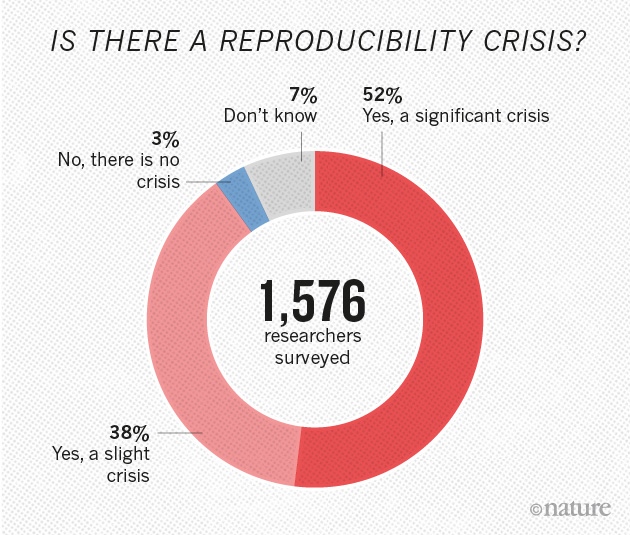It may sound like a trivial issue, but it absolutely is not: scientific studies that can’t be replicated are worthless, yet our lives are often impacted by these failed studies, especially when politicans are guided by junk science results:
More than 70% of researchers have tried and failed to reproduce another scientist’s experiments, and more than half have failed to reproduce their own experiments. Those are some of the telling figures that emerged from Nature‘s survey of 1,576 researchers who took a brief online questionnaire on reproducibility in research.
The data reveal sometimes-contradictory attitudes towards reproducibility. Although 52% of those surveyed agree that there is a significant ‘crisis’ of reproducibility, less than 31% think that failure to reproduce published results means that the result is probably wrong, and most say that they still trust the published literature.
Data on how much of the scientific literature is reproducible are rare and generally bleak. The best-known analyses, from psychology and cancer biology, found rates of around 40% and 10%, respectively. Our survey respondents were more optimistic: 73% said that they think that at least half of the papers in their field can be trusted, with physicists and chemists generally showing the most confidence.
The results capture a confusing snapshot of attitudes around these issues, says Arturo Casadevall, a microbiologist at the Johns Hopkins Bloomberg School of Public Health in Baltimore, Maryland. “At the current time there is no consensus on what reproducibility is or should be.” But just recognizing that is a step forward, he says. “The next step may be identifying what is the problem and to get a consensus.”
Failing to reproduce results is a rite of passage, says Marcus Munafo, a biological psychologist at the University of Bristol, UK, who has a long-standing interest in scientific reproducibility. When he was a student, he says, “I tried to replicate what looked simple from the literature, and wasn’t able to. Then I had a crisis of confidence, and then I learned that my experience wasn’t uncommon.”
The challenge is not to eliminate problems with reproducibility in published work. Being at the cutting edge of science means that sometimes results will not be robust, says Munafo. “We want to be discovering new things but not generating too many false leads.”





Government money being handed out in a partisan fashion creates results that support the government but cannot be duplicated. Ya, that works for science. What is the most egregious are the number of “progressives” who support this kind of “science”. Damn, I hated putting science in quotes, but, here we are.
Comment by Dwayne — November 4, 2020 @ 11:42
Incentives matter, and getting a study published increases the author’s chances of government funding, especially if the study’s findings co-incide with the government’s latest bee-in-bonnet fascinations. Along with the “publish-or-perish” model of academia, where those academics with more publications to their names are the ones more likely to get full professorships with tenure, there’s a lot of pressure to pump out non-reproducible shit because … even if someone tries to replicate your results, there are few to no negative side effects. If someone publishes to expose or refute your findings, it’ll be a case of mutually assured (academic) destruction.
Comment by Nicholas — November 5, 2020 @ 09:12